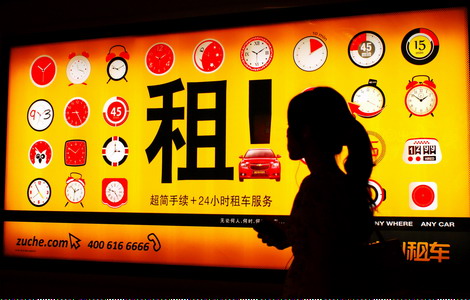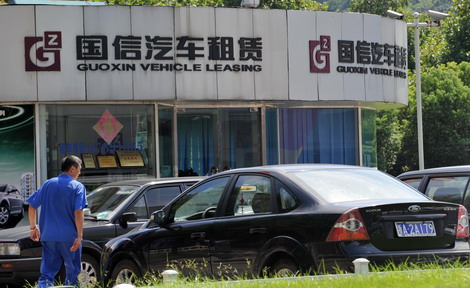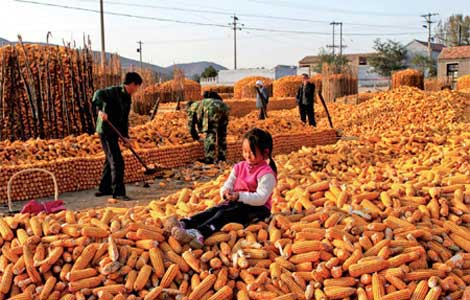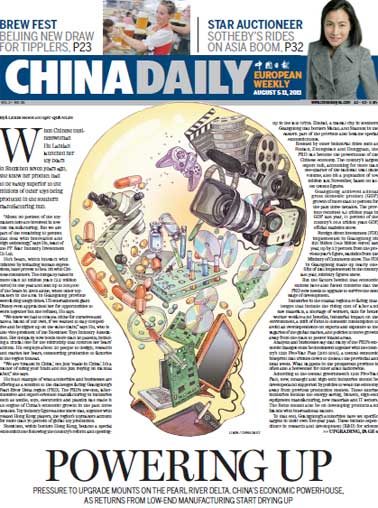Cars
Car rentals hit top gear as road to growth beckons
Updated: 2011-08-11 09:26
By Hu Yinan and Wang Yan (China Daily)
|
 |
|
China Auto Rental advertises 24-hour service and convenient car rental procedures on a billboard in Shanghai. [Photo / China Daily] |
Air tickets are too expensive, trains aren't always safe, cabbies are on strike and car purchases are still limited. For bank clerk Lian Ping, it seemed as if all travel options had run out for her birthday trip from Beijing to Shandong province.
"It wasn't until a few days ago that I realized with my driver's license I could just rent a car and drive there," Lian said on Friday, four days before her 29th birthday. "The thought never crossed my mind before. I didn't even know people offered auto rental services here."
She decided to rent a Dongfeng Citroen for $15 a day and drive to Qingdao on Monday. The total cost, at $60, was only slightly more than if she took a train, Lian said. "It'd be more fun to drive."
The growth of car sales took an unprecedented downturn after officials withdrew stimulus policies and instituted measures to curtail traffic congestion, but corporate analysts and industry insiders say the auto rental market could become China's next big hope.
"Emerging car rental businesses will become the best propellant for the entire (auto) industry. The prospects are enormous," said Zhang Xiaolin, chairman of Haina International Auto Leasing, a Sino-Japanese joint venture in the eastern Zhejiang province.
By 2015, China's car rental market is expected to hit 400,000 vehicles and produce $2.8 billion in annual revenue, according to the China Taxicab and Livery Association. Consulting firm Roland Berger put that estimate at $5.9 billion.
"It's like real estate. In the end, the volume of rentals will definitely surpass sales," said Zhang Ruiping, chairman and CEO of Shanghai-based eHi Car Service, a major player in the market.
|
 |
|
China has about 5,000 registered auto rental companies. This one is in Hangzhou, Zhejiang province. [Photo / Others Provided] |
Once known as the bicycle kingdom, China turned into one of the world's largest automobile consumers in just a matter of years. Its civilian automobiles soared from 31.6 million in 2005 to 91 million last year. That number is expected to hit 200 million by 2020, said Wang Fuchang, deputy director of the equipment industry department in the Ministry of Industry and Information Technology.
But after years of rapid growth, China's auto market, already the world's largest, is experiencing complex readjustments. In mid-July, Xinhua News Agency acknowledged that the car market "has created some serious problems: gridlock, pollution and energy shortages".
As private auto purchases slow, car rental companies and advocates have picked up a 2009 government work report by Premier Wen Jiabao - which stated, for the first time, that the administration would "facilitate the development" of the car rental market - as a green light from the top.
Sights set high
In this growing, fragile and loosely regulated sector, companies are fighting for market control.
The biggest winner thus far appears to be Beijing-based China Auto Rental, the industry's No 2 player behind eHi until last summer, when it had about 6,000 cars in 28 cities. The tables have now turned, and China Auto Rental is operating in 58 cities, boasts a fleet of 22,000 and aims to almost double that figure by year-end.
The company acquired two of its major competitors in October and April for a total of $14 million.
Inside sources say it has also been negotiating to buy out the industry's third-largest player, TopOne Car Rental in Shenzhen, the industrial powerhouse in the south's Guangdong province. TopOne's chairman, He Weijun, said he has "never heard of the plan".
In late July, China Auto Rental expanded into eHi's turf by opening a 24-hour store in the heart of Shanghai. But its ambitions are much higher.
Lu Zhengyao, the company's chairman and CEO, said previously at a news briefing that increasing the size of the corporation was a priority over the next three years. When asked about the financial sustainability of its expansion, China Auto Rental's vice-president and regional manager in Shanghai, Hu Haibin, said: "We try not to lose money."
The market is highly fragmented. However, as China Auto Rental deepens its dominance in the sector, it is seeking to "become one of the largest car purchasers and, in turn, a stakeholder that has an influence in the global auto industry", said its vice-president, Yang Yanying.
China Auto Rental is blessed by Legend Holdings, parent of Lenovo Group. Last September, Legend Holdings injected $190 million into the company, bringing it under Legend's corporate umbrella.
E-paper

My Chinese Valentine
Local businesses are cashing in on a traditional love story involving a cow herder and a goddess
Outdoor success
Lifting the veil
Allure of mystery
Specials

Star journalist leaves legacy
Li Xing, China Daily's assistant editor-in-chief and veteran columnist, died of a cerebral hemorrhage on Aug 7 in Washington DC, US.

Sowing the seeds of doubt
The presence in China of multinationals such as Monsanto and Pioneer is sparking controversy

Lifting the veil
Beijing's Palace Museum, also known as the Forbidden City, is steeped in history, dreams and tears, which are perfectly reflected in design.
